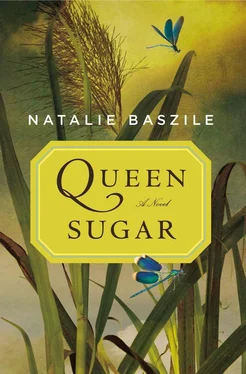Denton reappeared. “We’re changing up the plan,” he said, slightly winded. “We’re not bidding on the I.H. anymore.”
“Not — what?” Charley said. The auctioneer was calling for lot one thirty-five now. The I.H. was lot one thirty-six. “You said it’s the best tractor here. We need it.”
“Next up, lot one thirty-six,” the auctioneer called. “An I.H. 1066. Crank it up, Billy. All right, boys. Let’s put a little money up. We’ll start at seven thousand.”
A man climbed up into the I.H. and started the engine. It was the closest thing Charley had heard to a machine purring. She got her card ready. Denton grabbed her wrist. “Just hold on.” He leaned forward and stared at the ground as though he were trying to hide.
And suddenly, Charley disliked him. The slight hump in his back — his old man’s back — as he leaned forward to rest his hands on his knees; his fingers with their wrinkled knuckles and nails like rinds of parmesan; his ridiculous pressed overalls and his old-fashioned shoes. They needed that tractor, she needed that tractor if she wanted anything close to a chance of making it, and she’d be damned if she sat back while some old man who was afraid of his shadow told her what to do. This wasn’t 1945, Charley wanted to say. There was nothing to be afraid of. No wonder her father hated the South. No wonder he ran for his life.
“Eight thousand for the I.H.,” the auctioneer called. “Who’ll elbow in? Eight. Can I get eight and a half?”
“Here.” Charley raised her card as all heads turned to look.
“Eight and a half, right there. Thank you, madam. Who’ll show me nine?”
Denton glared at her. “What are you doing?”
“That guy’s not the rainmaker.”
“Nine down in front,” the auctioneer said.
“There, you see,” Charley whispered. “He didn’t bid.”
The auctioneer called for nine and a half. A man the next row over gave a signal.
“Nine and a half. Can I get ten?”
The auctioneer called for nine five again. The man in the next row bid. Charley raised her bidder’s card. Denton grabbed her arm. “I’m trying to tell you,” he said, but she ignored him. Denton never swore, but Charley heard him swear under his breath. “I’ll be g’all damned.”
“Ten five,” the auctioneer said.
Charley kept her card raised. The tractor wasn’t worth more than thirteen, that’s what Denton said. Anything over thirteen, they’d agreed they’d walk away. The man in front dropped out of the bidding; it was just her and the man in the next row. Maybe she’d get it at ten five. Maybe eleven. The rainmaker hadn’t made a peep. Charley turned to him. She stared him right in the eye, dared him to jump in. He seemed not to see her, didn’t move or look in her direction, and she was flushed with relief. She was right. He was just another farmer, an ordinary man. The auctioneer asked for eleven and Charley’s card was still raised. Another few seconds and the tractor would be hers. She’d show Denton that times had changed.
“Eleven, going once.”
The rainmaker signaled — two fingers.
“Thirteen!” the auctioneer cried.
For a moment, Charley couldn’t move. When she did turn her head, the rainmaker met her gaze and she saw that thing in his expression that Denton must have seen earlier: a coldness, a steely indifference that made her shudder, and she understood she’d done exactly what he knew all along she’d do.
“Thirteen.” The auctioneer looked at Charley. “Do I have fourteen?”
If she continued, she’d be over her limit. She’d have paid more than Denton swore the tractor was worth. If she dropped out, Baron and Landry would have won.
Charley raised her card.
Fourteen. Fourteen five. Each time she bid, the rainmaker bid higher. Fifteen. Fifteen five. Denton leaned over and whispered something to her, something hot and blistering, though she couldn’t make out the words for the rushing in her ears. Then he pushed his way through the crowd. And though she panicked to realize Denton was gone, Charley reasoned, somewhere in the back of her brain, that when it was all over and the tractor was theirs, he’d understand and agree she’d done the right thing. It all would have been worth it. She’d won.
“Sixteen thousand.”
The auctioneer seemed to spot someone far behind her. “Seventeen thousand in the back. Come on, boys, somebody put me in the money. Can I get seventeen five?”
Charley stole a glance at the rainmaker. He didn’t move or look her way, but she knew he was waiting for her, ready to pounce if she kept bidding. Now someone else had thrown his hat in the ring. For all she knew, it was another of Baron’s cronies. Silence hung over the crowd. It lasted only a few seconds — but it was enough for Charley to realize the harm she’d done, the damage she’d cause if she continued this ridiculous game. She had no idea where Denton was, what he was doing, but she was pretty sure he’d given up on her. And who wouldn’t? Who’d want to work with someone who refused to listen, refused to learn? Who had that kind of time to waste?
“Seventeen, going once. Twice.”
Charley folded her bidder’s card and shoved it deep in her pocket. There would be other tractors.
“Last call for lot one thirty-six. Sold! For seventeen thousand.”
• • •
After the fiasco with the I.H., Charley tore up her bidder’s card, then watched through a fog of humiliation and distress as the rest of the equipment, tractors included, sold for a fraction of what she bid. She barely noticed who bought what and stayed only because she would rather have slept on a bed of nails than walk through that crowd. Denton was right about one thing: one’s heart went out to the farmer who once owned all that stuff. It was tough seeing a three-row chopper, probably eight or nine thousand dollars new, go for two hundred bucks. A whole life’s work, years of struggling to make ends meet. How could farmers stand it?
Behind the office, the people at the hot dog booth were packing up. Someone had slashed through the prices with a red marker and hot dogs were only a quarter. Charley was not thirsty, but she bought a Coke, hoping the carbonation would settle her stomach. The air had that heavy, expectant feel, as though at any moment someone would shout or fire a gun. In a couple hours the regular afternoon showers would turn the sky a steely gray, and crooked fingers of lightning would illuminate the horizon. The storm would only last half an hour, Charley thought, but by the time she got back to Saint Josephine, it would be too wet and maybe too dark to do anything on the farm. Better to go back to Miss Honey and Micah, lick her wounds tonight and crawl back to Denton tomorrow.
• • •
The rainmaker, Landry, and Baron were long gone. Up and down the rows, farmers loaded air compressors, old sinks, and batteries into their trucks. Standing alone in the shade of a shabby oak, Charley was afraid to check the parking lot for Denton’s truck. Just the thought that he’d quit made her light-headed with shame. She’d acted foolishly. Now she had to go home and tell Micah and Miss Honey how badly she’d blown it. She’d have to sit there while Ralph Angel laughed in her face.
The empty Coke can still in her hand, Charley walked toward the parking lot, braced for the sight of the empty spot where Denton’s truck had been. But his truck was there, and yes, thank God, there he was, leaning against its door as he flipped through a stack of receipts, the ones, Charley recalled, he stuffed above his visor. She had never been so happy to see those Liberty overalls, the bald head, or that raggedy old truck, as she was right now. Her first impulse was to run over, hurl herself on the ground, and beg for forgiveness. She would apologize for everything: the bidding, the money, all the stupid questions she’d ever asked — all of it — if he’d just give her another chance. And she was just about to when Denton looked up, noticed her, and she saw something in his expression. Disgust? Disappointment? All Charley knew was that she had never seen him look so unfriendly. Denton stared at her for a moment, then went back to his receipts.
Читать дальше












